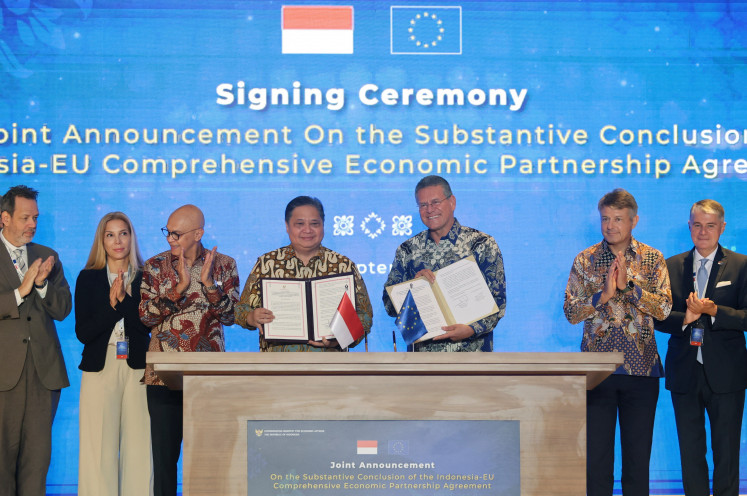Popular Reads
Top Results
Can't find what you're looking for?
View all search resultsPopular Reads
Top Results
Can't find what you're looking for?
View all search resultsEditorial: We can't stop urbanization
Despite its manifold and complex problems, Jakarta remains a destination city for many Indonesians, as attested to by the recent arrival of tens of thousands of newcomers following the Idul Fitri holiday
Change text size
Gift Premium Articles
to Anyone
D
espite its manifold and complex problems, Jakarta remains a destination city for many Indonesians, as attested to by the recent arrival of tens of thousands of newcomers following the Idul Fitri holiday. With more people flooding in, the city will need to provide its citizenry with more food, water, housing and transportation services, among many other things, just to make ends meet.
Jakarta's magnetic force will attract the cream of the crop from all professions to come and work here and contribute to the city. But this migration also signifies the government's failure to create new economic growth centers in other parts of the country that could ease Jakarta's uphill burdens. New growth centers, particularly outside of Java, would help redistribute wealth and help to address the inequalities that exist between the densely populated island of Java and the rest of the country.
The Jakarta Population and Civil Registration Agency has estimated that some 70,000 newcomers have streamed into the city since Idul Fitri. This figure represents a 3 percent increase from last year's mark of 68,500.
With a current population of more than 10 million, Jakarta is already overpopulated and its infrastructure is no longer adequate to provide its citizens with proper facilities.
The state of overpopulation is visible in the city's daily traffic congestion which has come to characterize early 21st century Jakarta. The city's difficulties in fulfilling the basic needs of its growing population are also shown in the occupation of pedestrian facilities by street vendors and of riverbanks by squatters.
As an open city, Jakarta should not bar migrants. The city administration is allowed, however, to control population growth. Jakarta's government, for example, only allows residency for those with places to live and secure jobs. But such restrictions are ineffective as statistics reveal a steadily rising trend of new arrivals to Jakarta, measured during the period after Idul Fitri, from 47,832 in 2012 to 51,000 in 2013 and finally 68,500 in 2014.
As in previous years, the city administration will be forced to work hard to provide the newcomers with jobs and adequate healthcare, education, housing and transportation. Things will get worse if the newcomers are unskilled or uneducated; many of them would likely build make-shift houses alongside riverbanks, under bridges or alongside railway tracks, only to be forced to relocate to another area by public order officers.
Each year, Jakarta faces the same old problems related to the incoming migration of people. Sooner or later, Jakarta will simply be unable to bear this mounting burden.
To continue to exist as a viable city, Jakarta needs the help of both the central and regional governments. People will reconsider moving to Jakarta if attractive economic opportunities exist in their hometowns and villages. Building alternative centers of economic power is therefore critical to ensuring the very survival and success of Jakarta itself.
As long as the country fails to curb the disparity of wealth between Jakarta and the regions, urbanization of the capital will continue to flourish, and the residents of Jakarta will continue to suffocate under the gauze of overpopulation.










